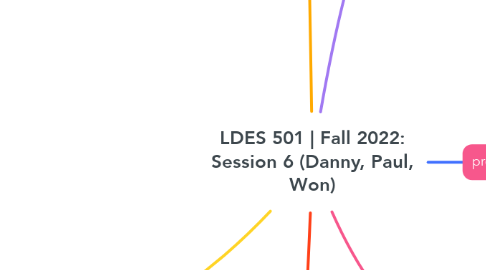
1. Rethink of assessment
1.1. Can Wiggins and McTighe's "six facets" serve as a universal model for learners' assessment, disregarding the level of the instructional model (mass, institutional, curriculum, course, unit, lesson, module, etc.)? (Ruihan)
1.2. Higher education is committed to developing students with creativity, leadership, collaboration, and deep thinking skills. So how should teachers set up assessment programs to demonstrate student learning outcomes in these more abstract conceptual skills? (Tingjie)
1.3. shouldn’t assessments (and maybe even grades) somehow reflect a student’s growth as opposed to just a static level of their skills and understanding? (Danny)
1.4. what is it about certain areas (e.g. math and history) that make creating assessments based on real-world problems more challenging? I)s there actually something about these fields that make this more challenging, or are they just stuck in these old ways of assessment? (Danny)
1.4.1. However, one question still makes me wonder if some effective assessment methods mentioned in this article are valid for all subjects. Is it possible to implement them in mathematics and art classes same time? (Aysu)
1.5. How different would it be if grades were never created and all we focused on was whether a student had experienced it or not? (Odmaa)
1.6. Why do you think we still rely on standardized tests for high-stakes events like admissions and decision-making?"(Won)
1.7. Should we also consider the culture, country, and other factors when we create a grading system? (Aysu)
1.8. The argument that effective evaluation is closer to the album than a single snapshot, and that the appropriate evaluation method should be selected according to the curriculum priority among various evaluation methods seems very valid. However, I wondered what kind of disadvantages there would be in this design. (Dayea)
1.9. What kinds of evidence do we need? What specific characteristics in student responses should we examine? Does the proposed evidence enable us to infer a student’s knowledge, skill, and understanding? (Nikisha)
1.9.1. When professors grade the student’s work, what is the essential element to be considered most? (assuming the task is not merely the multiple choices type of quiz, yet the essay or the project-based assessment) (Ambika)
1.9.2. It seems to me that grading participation does not reflect the student's understanding of course content. If grades are meant to reflect student mastery of course content, should participation be included in a grading system? (Eric)
1.9.3. Would carefully curated internships serve as an effective way to assess students on their acquired skills in real-world settings? (Nikisha)
1.9.4. Is students' self evaluation a valid and reliable assessment? (Paul)
2. Negative Effects of Grading System
2.1. I agree with the point that grades are psychologically harmful. It surely motivates students with high grades to get more high grades, and it stresses out the ones who are having trouble understanding the subject. But to think again, does accidentally getting a higher grade, like during a test (without fully understanding), motivate a struggling student? (Odmaa)
2.2. the practice of grading actually encouraged poor learning practices - if that is so, what are different institutions really trying to communicate with each other and how do they each translate the meaning of the grade? (Oluwafikayo)
2.3. If we rely too heavily on standardized test results, do we miss out on each student's potential? (Won)
2.4. Is there too much possibility for subjectivity and bias in grading? (Oluwafikayo)
2.5. Burden of Assessment for Teachers
2.5.1. Grading is a time suck for teachers - I would simply like to know why this is the case? And what can be done to change the mindset of teachers that share this ideology? (Oluwafikayo)
2.5.2. I felt like for some the assessment ideas that may take more time than others, how do we incorporate that into a curriculum that’s already kind of under a time crunch anyways? (Kathleen)
